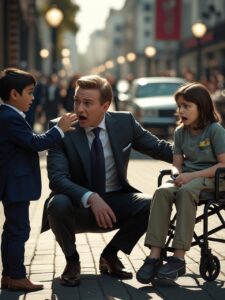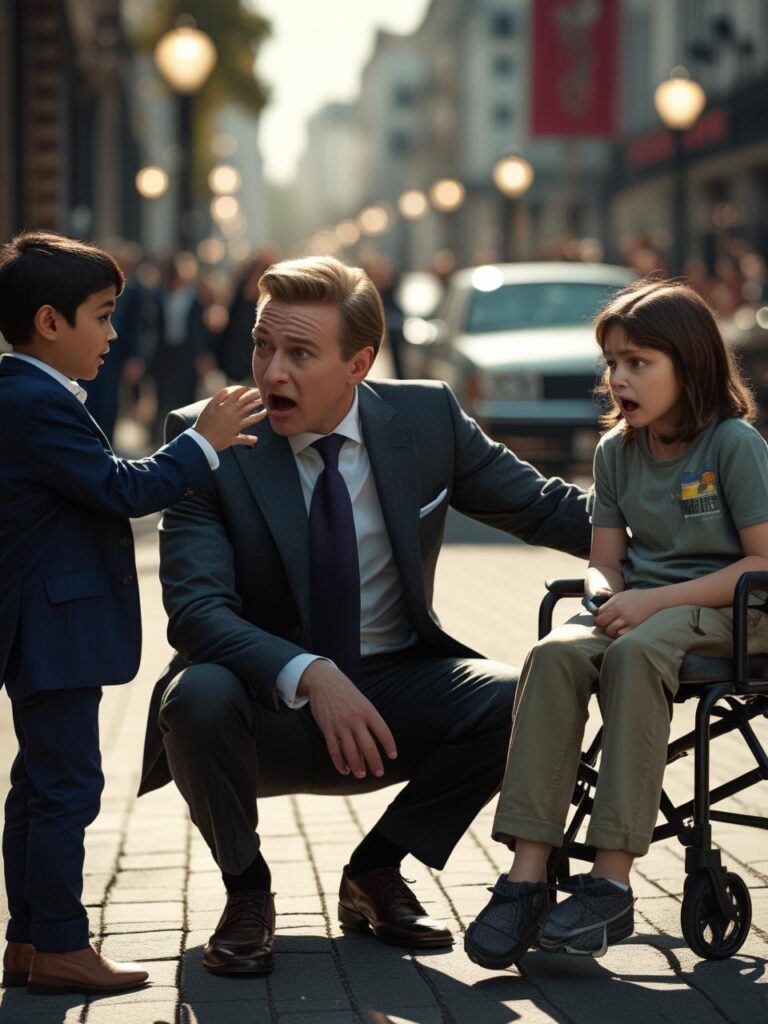What if a nine-year-old boy in duct-taped boots told you he could help your paralyzed daughter walk—and then he did? It was a biting cold morning in Birmingham, Alabama. Not snowing, but cold enough that breath came out in clouds and fingertips ached. People hurried in and out of the Children’s Medical Center, bundled in layers, clutching coffee, rushing past pain like it might not catch them.
But one boy wasn’t rushing. He was seated outside on a worn cardboard square, sketching in a beat-up notebook.
His name was Ezekiel “Zeke” Carter. Just nine years old. His jacket hung too loose on him, one of his boots secured with duct tape, a red knit cap pulled low over his ears.
He never begged. Never bothered anyone. Just watched, smiled, and drew. At first, staff tried to move him along, but after a while, they gave up. He wasn’t causing trouble. He came back every week.
Nobody knew who he was waiting for. Maybe a parent, maybe a sibling. But no one asked. Not in a place like that.
Across the road, a shiny Range Rover idled. Inside, Jonathan Reeves sat looking worn despite his expensive suit. In the back seat, his daughter Isla sat swaddled in pink, unmoving. Her legs no longer responded. A car crash had taken her mobility.
Jonathan lifted her out and headed for the entrance. Zeke watched. Then stood.
“Sir, I can help your daughter walk again,” he said. Calm. Direct. Certain.
Jonathan froze. “What did you say?”

Zeke repeated it. Jonathan stared, confused and tired, then shook his head and walked on.
But the boy’s words lingered. Echoing through all the doctors’ cautious words and clinical advice. He couldn’t forget the kid.
When he came back out, Zeke was still there. Jonathan challenged him. Zeke didn’t back down.
His mother had been a physical therapist. She used her hands, her patience, and belief to help people move again. No machines. Just care.
Against his better judgment, Jonathan agreed. “Meet us tomorrow at Harrington Park. Noon.”
Zeke arrived early. He brought a towel, socks, cocoa butter, a tennis ball, and warm rice wrapped in cloth. His mother’s tools.
Jonathan came with Isla. Zeke asked if he could try. Jonathan hesitated, then nodded.
Zeke worked gently, talking with Isla while he moved her legs. Warming muscles. Building trust. He asked questions about her favorite things, and she began to ask him questions too.
After a while, she felt pressure in her legs. It wasn’t much. But it was something.
They came back the next Sunday. And the one after that. Isla began to tap her toes. Then wiggle them. Then lift her knees.
Zeke never asked for payment. He never missed a session. Jonathan started helping, learning massage points, pressure techniques, stretches.
One Sunday, Isla broke down. She couldn’t move anything that morning. She wanted to quit. Zeke knelt beside her and shared his own grief. His mom’s illness. The fear. The anger. The need to keep trying anyway.
She listened. And later that day, she moved her foot.
Jonathan invited Zeke to live with them. He had a room, meals, safety. But he never lost focus. Every morning, he helped Isla. She improved, little by little.
Word spread. A nurse saw them. Told others. Families started showing up at the park. Zeke gave up his one-on-one time with Isla to help new kids.
No big speeches. Just warm packs, exercises, encouragement.
A local reporter wrote a story. Donations, mentoring offers, and tutoring support followed. Still, Zeke stayed the same. Quiet. Focused.
By week nine, the park was full. And Isla was ready.
“On three,” Zeke said.
She stood. Unsteady. Shaking. But standing. Then she walked—a few steps—into her father’s arms.
That night, Jonathan watched Zeke pour cereal. “You changed everything,” he said.
Zeke smiled. “That’s what my mom would’ve done.”
Because sometimes, the ones with the least have the most to give. They show up. They care. And they make healing happen.
If this story touched your heart, pass it on. And if you ever meet a child like Zeke—or a fighter like Isla—tell them this: you’re seen, you’re valued, and your journey’s not over. It’s just beginning.


